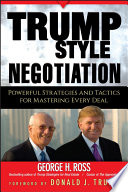

Trump emphasizes the importance of understanding the deal-making process as an art form. He believes that successful negotiation is not just about numbers but about human psychology, relationships, and the ability to read people. He outlines strategies for building rapport and creating win-win situations, which involve active listening, empathy, and the ability to tailor your approach based on the other party's motivations. The idea is that negotiation is as much about perception and influence as it is about the actual terms of the deal.
Continue readingOne of the hallmark strategies that Trump advocates is the use of aggressive tactics. This includes setting high initial demands and being unapologetically assertive in negotiations. Trump argues that by starting high, you create room for concessions, and the other party may feel compelled to negotiate down from your initial offer. He also discusses the importance of being willing to walk away from a deal if it does not meet your needs, which can often lead to better outcomes as it shows strength and confidence.
Continue readingIn negotiations, knowledge is power. Trump stresses the importance of doing thorough research and gathering as much information as possible about the other party, the market, and the specifics of the deal at hand. This knowledge allows you to leverage facts to your advantage, anticipate objections, and formulate counteroffers that are more likely to be accepted. The ability to ask the right questions and listen carefully to the answers is crucial for uncovering valuable insights.
Continue readingTrump points out that creating a sense of urgency can be a powerful tool in negotiations. By establishing deadlines or limited-time offers, you can motivate the other party to make decisions more quickly. This tactic can prevent prolonged negotiations that lead to fatigue and indecision. Trump suggests that urgency can also be created by highlighting the potential loss or missed opportunity if the deal is not completed promptly, which can be particularly effective in competitive scenarios.
Continue readingWhile Trump is known for his hard-nosed negotiation style, he also emphasizes the importance of building long-term relationships. He advocates for maintaining a positive rapport with negotiating partners, even if the negotiations are contentious. By fostering goodwill and trust, you can create opportunities for future collaborations and deals. Trump believes that successful negotiation is not just about the immediate outcome but also about the potential for future interactions.
Continue readingTrump discusses the psychological aspects of negotiation, including the use of tactics that can unnerve or unsettle the other party. This includes making bold statements, using humor, or employing silence strategically. The goal is to gain a psychological edge that can influence the negotiation outcome. Understanding the emotional dynamics at play can help negotiators steer discussions in their favor and maintain control over the negotiation process.
Continue readingFinally, Trump highlights the need for flexibility and adaptability during negotiations. He advises negotiators to be prepared to pivot and adjust their strategies based on the flow of the conversation and the responses from the other party. This adaptability can lead to creative solutions that satisfy both parties' interests and can prevent stalemates. Being open to new ideas and willing to compromise on certain points can lead to more successful outcomes.
Continue readingThe reading time for Trump-Style Negotiation depends on the reader's pace. However, this concise book summary covers the 7 key ideas from Trump-Style Negotiation, allowing you to quickly understand the main concepts, insights, and practical applications in around 20 min.
Trump-Style Negotiation is definitely worth reading. The book covers essential topics including The Art of the Deal, Aggressive Tactics, The Power of Information, providing practical insights and actionable advice. Whether you read the full book or our concise summary, Trump-Style Negotiation delivers valuable knowledge that can help you improve your understanding and apply these concepts in your personal or professional life.
Trump-Style Negotiation was written by George H. Ross.
If you enjoyed Trump-Style Negotiation by George H. Ross and want to explore similar topics or deepen your understanding, we highly recommend these related book summaries:
These books cover related themes, complementary concepts, and will help you build upon the knowledge gained from Trump-Style Negotiation. Each of these summaries provides concise insights that can further enhance your understanding and practical application of the ideas presented in Trump-Style Negotiation.